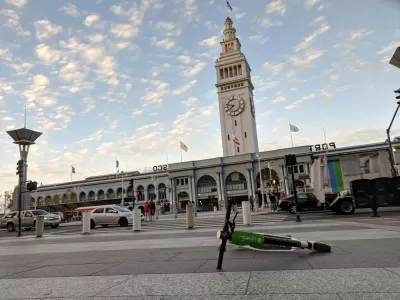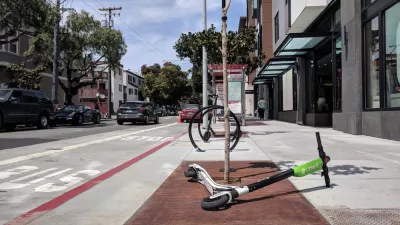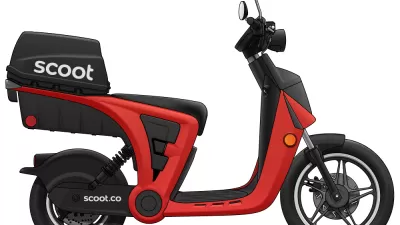The city attorney vows to bring order to the streets (and sidewalks) of San Francisco by requiring electric scooter share companies to apply for permits. First step: all e-scooters must be removed by June 4, or risk a $100 fine per day per scooter.

Three dockless, electric scooter share companies, LimeBike, Spin, and Bird, unloaded hundreds of their scooters in San Francisco in late March. "In their short time in the city, the two-wheelers have become a divisive issue, drawing passionate fans and enraged foes," reports Michael Cabanatuan, transportation reporter for the San Francisco Chronicle on May 24.
“As of June 4, they have to be off of the city streets (and sidewalks),” City Attorney Dennis Herrera said. “In the event they are not taken off the streets the (San Francisco Municipal Transportation Agency or MTA) will take that behavior into account, and I will reserve the right to do anything legally to make sure the law is enforced.”
Companies will be fined $100 a day, plus fees, for each scooter left in a public right of way after June 4.
Step 2: Complete an SFMTA Powered Scooter Share Program Permit Application. While the city is allowing a total of five companies to operate powered scooter share programs, the total number of scooters allowed is limited to 1,250 during the first six months of the one-year pilot program, and possibly rising to 2,500 during the second six.
As part of their permit applications, companies must show how they will keep the sidewalks clear of scooters, provide insurance, offer plans for low-income riders, provide trip data to the SFMTA, and protect the privacy of scooter renters and their mobile phone data.
Companies are required to pay "a $5,000 application fee and $25,000 annual permit fee, creating a $10,000 endowment per company to cover city costs associated with property repair and maintenance," writes SFMTA's Director of Sustainable Streets, Tom McGuire.
Step 3: Receive permit, return scooters to the streets, and comply with permit terms.
The process has been received positively by all three scooter-share companies, adds Cabanatuan.
Bird spokesman Kenneth Baer said: “We look forward to working closely with the SFMTA to obtain a permit. In just a short time, tens of thousands of San Franciscans have ridden more than 100,000 miles on Birds. The demand for a way to get around San Francisco that does not add to congestion or carbon emissions is clear, and we look forward to meeting it in the days to come.”
How did San Francisco get to this point?
The San Francisco Board of Supervisors authorized MTA to develop a permit process after receiving numerous complaints on how scooters were left on city sidewalks, creating hazards for pedestrians. Last month, the city's Public Works Department impounded 66 of the scooters, and the city attorney initiated a "cease and desist" order banning the rental companies from operating illegally.
"Similar to what the city did around dockless bikes, the city is looking to do the same with dockless scooters," reported Megan Rose Dicke for TechCrunch on April 16. "The idea isn’t to ban them, but rather to ensure there are rules and regulations around scooters, and that they don’t cause a public nuisance."
Other cities, like Coronado, Calif., which has threatened to impound dockless bikes, and San Diego, where merchants want a moratorium on new bikeshare companies, should take notice.
While scooters may cause some problems on sidewalks in San Francisco, when it comes to bikeshare, things appear to be running smoothly. The city allows only one dockless bikshare company, JUMP, to operate. Unlike conventional dockless bikeshare, JUMP bikes come with a U-lock, so the bikes must be locked to a bike rack or street pole.
Ford Go-Bike operates a traditional docking bikeshare operation, taking over operations from Bay Area Bike Share on June 28, 2017. Last month, they added 250 electric bikes to their fleet of 2,500 bikes, presumably to keep up with JUMP, which offers only ebikes.
FULL STORY: SF begins rental scooter permit process — they could vanish for much of June

Maui's Vacation Rental Debate Turns Ugly
Verbal attacks, misinformation campaigns and fistfights plague a high-stakes debate to convert thousands of vacation rentals into long-term housing.

Planetizen Federal Action Tracker
A weekly monitor of how Trump’s orders and actions are impacting planners and planning in America.

San Francisco Suspends Traffic Calming Amidst Record Deaths
Citing “a challenging fiscal landscape,” the city will cease the program on the heels of 42 traffic deaths, including 24 pedestrians.

Defunct Pittsburgh Power Plant to Become Residential Tower
A decommissioned steam heat plant will be redeveloped into almost 100 affordable housing units.

Trump Prompts Restructuring of Transportation Research Board in “Unprecedented Overreach”
The TRB has eliminated more than half of its committees including those focused on climate, equity, and cities.

Amtrak Rolls Out New Orleans to Alabama “Mardi Gras” Train
The new service will operate morning and evening departures between Mobile and New Orleans.
Urban Design for Planners 1: Software Tools
This six-course series explores essential urban design concepts using open source software and equips planners with the tools they need to participate fully in the urban design process.
Planning for Universal Design
Learn the tools for implementing Universal Design in planning regulations.
Heyer Gruel & Associates PA
JM Goldson LLC
Custer County Colorado
City of Camden Redevelopment Agency
City of Astoria
Transportation Research & Education Center (TREC) at Portland State University
Jefferson Parish Government
Camden Redevelopment Agency
City of Claremont




























